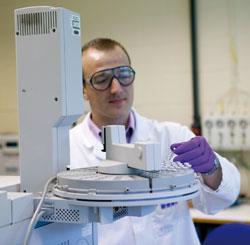When food is contaminated, teams of chemists are at hand to help track down the molecular culprits, reports Sarah Houlton
When food is contaminated, teams of chemists are at hand to help track down the molecular culprits, reports Sarah Houlton
We take it for granted that the foods we buy are safe and contain the ingredients they claim. But what if there’s a problem? That’s where chemists come in; analytical chemistry is the key to identifying what’s going on when something is wrong with a food product.
Chemical culprits
’If there’s a potential contamination issue, we work through the supply chain to try and work out what the contamination could be,’ explains Ellen Norman, technical specialist at UK firm RSSL (Reading Scientific Services Ltd), who has a PhD in brewing analysis. ’I use a range of chemistry, either pulling on the knowledge I already have, or if it’s something I’m not familiar with I sometimes have to become an expert on a topic quite quickly.’

It makes for a very varied working life. ’One day we could be looking at moisture levels, and the next trying to work out complex pharmaceutical breakdown products,’ she says. ’Sometimes it needs old-fashioned wet chemistry, and sometimes modern analytical methods are required.’
In-house expertise
As well as careers at specialist companies such as RSSL, there are also opportunities within the big food manufacturers. ’They will have someone in-house who is responsible for areas like food safety, risk analysis and regulatory compliance, and some also carry out analysis in-house rather than contracting it out,’ she says. ’It depends on the size of the organisation and what sort of ingredients they buy in. Some will double check their ingredients, and others will rely on supplier certification so they will only need to do the occasional spot-check.’
Fellow technical specialist Alan Rose specialises in taints and off flavours, plus flavour profiling. He started with the company after GCSEs and trained as an analytical chemist via day release, coming up through ONC, HNC and RSC qualifications. ’I investigate what has caused a foodstuff to give off a bad odour,’ he says. ’It’s mostly analytical chemistry, particularly GC-MS, and identifying unknowns,’ he says. He specialises in volatiles, many of which are taints, present in very low levels. ’Most harmful substances like chlorophenols are noticeable at such a low level you would have to consume hundreds of kilos of the product before it would have any effect on you,’ he says. ’Things like benzene in soft drinks are more of a problem - you can’t really smell it, but the allowed level is very low.’
Meanwhile Rob Griffiths, another RSSL technical specialist, works on oils and fats analysis. He got into this via a PhD in lipid biochemistry, and much of his role is answering questions about oils and fats. ’The queries can be quite varied,’ he says. ’They might want to know if they’ve got the right amount of fat within their product, if it’s the right type or blend of fats, or whether an expensive oil is genuine or has been adulterated with something cheaper.’
He uses a number of techniques, many of which are again chromatography based, such as GC and HPLC. ’A good example is olive oil,’ he says. ’EC regulations include a number of tests to authenticate extra virgin olive oil, and show it has not been adulterated with cheaper oils. These techniques can also be used on other types of oils and fats, including premium speciality oils like pumpkin seed oil and walnut oil.’
RSSL also does a lot of testing of fortified food. ’A lot of products these days claim to be fortified with omega-3 oils and we develop methods to check for them,’ Griffiths says. ’We don’t just produce analytical results - we can help companies understand what is going on if the results aren’t quite as expected.’
There are different challenges every day, he says. ’They can change throughout the day - what was a challenge in the morning can be replaced by something else that’s higher priority later. We may have methods in place already, we may have to search the literature for the right extraction process, and it may even involve developing an analytical method from scratch.’
Sarah Houlton is a freelance writer based in London, UK
Further Reading
To learn more about food forensics, and the RSSL, see The food detectives












No comments yet